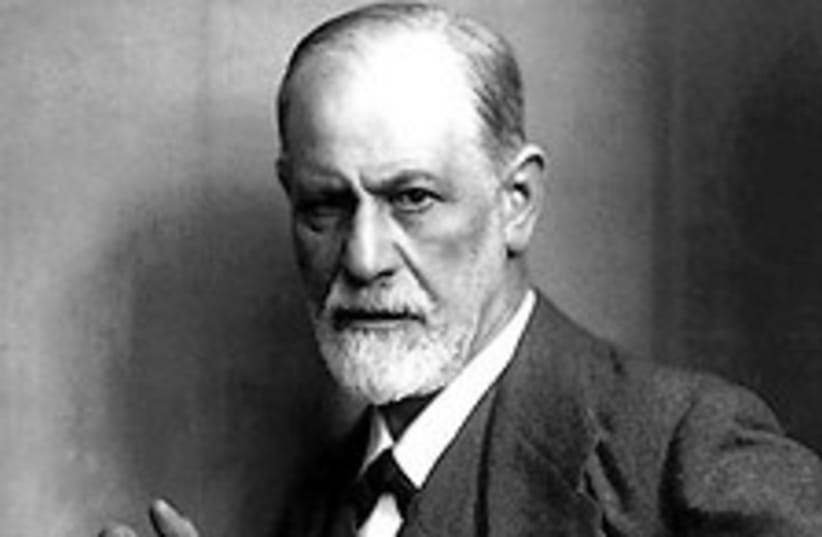'Freud's theory of repression should be dropped'
Bar-Ilan researcher cites 'lack of evidence,' claims repressing memories even has 'positive effect'.
There is "no evidence" for Sigmund Freud's "theory of repression" - that the "burying" of traumatic memories by the unconscious mind causes psychiatric disorders - even though it has been a cornerstone of his psychoanalytic theory for a century, according to Prof. Yacov Rofé, head of Bar-Ilan University's interdisciplinary department of social sciences.
Rofé conducted the "first" comprehensive study of 100 years of scientific literature related to this phenomenon and published his findings last month in Review of General Psychology. In a 23-page article that includes many hundreds of references, he wrote that there is "no empirical evidence to support repression's existence" - thereby invalidating what Freud himself described as the "foundation stone on which the whole structure of psychoanalysis rests." Thus, Rofé declared, it is time to "bury" Freudian repression, both as a cause and a factor in the treatment of psychiatric disorders.
By revealing the fundamental lack of scientific evidence for Freud's core tenet of repression, the study undermines long-held assumptions about the overall legitimacy of Freudian psychoanalytic theory. But by rejecting the Freudian worldview as a template for the understanding and treatment of psychopathology, Rofé's work opens up another, important question: How are we to understand mental illness?
"One would think that after such an extended discussion of the theory of repression by the psychoanalytic community, as well as clinicians and experts from other disciplines, there would be some solid evidence to support Freud's theory of repression," wrote Rofé. "Instead, I found none whatsoever."
Ever since Freud articulated his views, rival theories of psychopathology - based on behavioral, cognitive and biological models - "have challenged psychoanalysis in their characterization of clinical observations," he said. "But these schools of thought also suffer from fundamental empirical difficulties. We may need a new theory of psychopathology - perhaps a new concept of repression - that can provide insight into the underlying causes of psychiatric disorders."
The topic is not just a matter of historical debate, the BIU researcher continued, as repression is currently a hot issue in modern psychological research. Thus his published conclusions have important implications for the US legal system, which is currently debating whether alleged criminals can be convicted based on recovered memories of childhood sexual abuse.
"There have been cases of people who have been accused in courts of law on the basis of repressed memory. There is a serious controversy today whether such evidence can be used for conviction, as many believe that recovered memories are valid. However, there is some evidence indicating that psychodynamic therapists may encourage the production of false memories. This is strengthened by many experimental studies demonstrating the production of false memories," he said.
In classical psychoanalysis, repression is a uniformly negative phenomenon. Cited as the direct cause of mental illness, it is seen to affect the individual's psychological and physiological functioning for the worse, by preventing both the accurate perception of reality necessary for adequate coping and the discharge of harmful tension. But according to the psychological literature, repression - and the adoption of a "distorted" view of reality - can be a key factor in the maintenance of mental health.
"I examined the evidence to see whether Freud is right when he says distortion of reality is undesirable, and I found that the opposite is the case," Rofé insisted. "While repression of emotions may have deleterious effects on one's physical health, repression - as defined by Freud - was originally developed to account for the development of mental disorders and not of physical illnesses. Not only has the literature shown no causal link between repression and psychological illness; it has shown that repression - the 'distortion' of reality in which we put aside traumatic memories in order to focus on the positive - usually has a positive effect on psychological functioning."
Rofé also questioned another major concept of the Freudian worldview - the existence of an autonomous and powerful unconscious, which Freud believed to be responsible for activating the repressive process.
"Freud posits an unconscious mind that, in the case of trauma, literally takes over psychological functioning, preserving the anxiety-provoking contents of traumatic memories and controlling the pathogenic manifestation of repression in the form of psychiatric disorders," Rofé explained. "But investigators have not yet presented clear empirical evidence in support of a dynamic and sophisticated unconscious of this kind. This is not to say that simple, unconscious processes do not occur, but the lack of evidence for an autonomous, overruling unconscious entity tends to undermine the existence of the repression it is said to control."
Just as Freudian psychoanalysis gives repression a key role in the creation of mental illness, it defines the "lifting of repression" - the retrieval of long-buried memories - as the key to mental health. Here again, Rofé insists on the basis of his research that this is not backed up by empirical evidence.
"Based on the evidence gathered from clinical studies performed over the last 100 years, there is no evidence that psychoanalysis is more effective than other methods for the treatment of trauma," he insisted, adding that, to whatever extent psychoanalysis was beneficial to patients, there was no causal link proven between the treatment's benefits and the retrieval of repressed memories.
if(catID != 151){
var cont = `Take Israel home with the new
Jerusalem Post Store
Shop now >>
`;
document.getElementById("linkPremium").innerHTML = cont;
var divWithLink = document.getElementById("premium-link");
if(divWithLink !== null && divWithLink !== 'undefined')
{
divWithLink.style.border = "solid 1px #cb0f3e";
divWithLink.style.textAlign = "center";
divWithLink.style.marginBottom = "40px";
divWithLink.style.marginTop = "40px";
divWithLink.style.width = "728px";
divWithLink.style.backgroundColor = "#3c4860";
divWithLink.style.color = "#ffffff";
}
}
(function (v, i){
});

